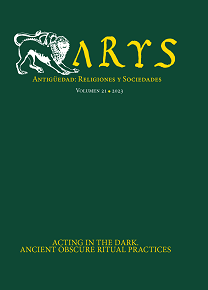Day and Night, Light and Darkness in the Bacchae of Euripides
Abstract
In my paper, I am following the theme of light and darkness in the Bacchae of Euripides. Light and darkness is one of many threads of meaning in the Bacchae. It runs alongside the overall interpretation of the play. Light and darkness are present in the characterisations of Dionysus and Pentheus. More than that, the characterisations through light and darkness change in accordance with the story of the play. A close reading of Bacchae along the lines of light and darkness can, thus, help to determine which evaluations of Pentheus and Dionysus are inscribed in the play. The drama of light and darkness suggests an interpretation of the sparagmos as an expiating sacrifice and the restoration of harmony at the end of the play.
Downloads
References
Aguirre, Mercedes (2010). Erinyes as Creatures of Darkness. In Christopoulos, Karakantza & Levaniouk, 2010, pp. 133-141.
Barzini, Luigi (2021). Mystery Cults, Theatre and Athenian Politics. A Reading of Euripides’ Bacchae and Aristophanes’ Frogs. London: Bloomsbury.
Burkert, Walter & Marinatos, Nannos (2010). Introduction. In Christopoulos, Karakantza & Levaniouk, 2010, pp. XV-XX.
Buxton, Richard (1989). The Messenger and the Maenads. A Speech from Euripides’ Bacchae (1043-1152). Acta Antiqua Academiae Scientiarum Hungaricae, 32, pp. 225-234.
Buxton, Richard (2009). Feminized Males in Bacchae. The Importance of Discrimination. In Goldhill & Hall, 2009, pp. 232-250.
Christopoulos, Menelaos, Karakantza, Efimia D. & Levaniouk, Olga (eds.) (2010). Light and Darkness in Ancient Greek Myth and Religion. Greek Studies: Interdisciplinary Approaches. Lanham: Lexington Books.
Diggle, James (1994). Euripidis fabulae / 3: Helena, Phoenissae, Orestes, Bacchae, Iphigenia Aulidensis, Rhesus. Oxford: Clarendon Press.
Diller, Hans (1971). Kleine Schriften zur antiken Literatur. München: C.H. Beck.
Dodds, Eric R. (1929). Euripides the Irrationalist. Classical Review, 43, pp. 97-104.
Dodds, Eric R. (1944). Bacchae. Oxford: Clarendon Press.
Doroszewski, Filip & Karłowicz, Dariusz (eds.) (2021). Dionysus and Politics. Constructing Authority in the Graeco-Roman World. London: Routledge.
Foley, Helene P. (1985). Ritual Irony, Poetry and Sacrifice in Euripides. Ithaca: Cornell University Press.
Friedrich, Enno (2022). “Green Vines on the Slag of Ruin”? The Choir in Euripides’ Bacchae. Sapiens Ubique Civis, 3, pp. 87-110.
Garvie, Alex (2016). Paradoxes and Themes in Bacchae. In Stuttard, 2016, pp. 109-120.
Girard, René (1988) [1972]. Violence and the Sacred. Translated by Patrick Gregory. London: Continuum.
Goldhill, Simon (1986). Reading Greek Tragedy. Cambridge: Cambridge University Press.
Goldhill, Simon & Hall, Edith (eds.) (2009). Sophocles and the Greek Tragic Tradition. Cambridge: Cambridge University Press.
Grube, George M.A. (1935). Dionysus in the Bacchae. Transactions and Proceedings of the American Philological Association, 66, pp. 37-54.
Hall, Edith (2016). Perspectives on the Impact of Bacchae at its Original Performance. In Stuttard, 2016, pp. 11-28.
Hose, Martin (1991). Studien zum Chor bei Euripides, II. Stuttgart: Teubner.
Karamanou, Ioanna (2016). Family Reunion or Household Disaster? Exploring Plot Diversity in Euripides’ Last Production. In Stuttard, 2016, pp. 43-57.
Kirk, Geoffrey S. (1979). The Bacchae of Euripides. Cambridge: Cambridge University Press.
Kitto, Humphrey D.F. (1939). Greek Tragedy. A Literary Study. London: Methuen.
Kyriakou, Poulheria & Rengakos, Antonios (eds.) (2016). Wisdom and Folly in Euripides. Berlin: De Gruyter.
Leinieks, Valdis (1996). The City of Dionysos. Stuttgart: Teubner.
Létoublon, Françoise (2010). Blind People and Blindness in Ancient Greek Myths. In Christopoulos, Karakantza & Levaniouk, 2010, pp. 167-180.
McClure, Laura (ed.) (2017). A Companion to Euripides. Chichester: Wiley Blackwell.
Mills, Sophie (2006). Euripides, Bacchae. London: Duckworth.
Morgan, Kathryn A. (ed.) (2003). Popular Tyranny. Sovereignty and Its Discontents in Ancient Greece. Austin: University of Texas Press.
Norwood, Gilbert (1908). The Riddle of the Bacchae. The Last Stage of Euripides. Manchester: University of Manchester Press.
Oranje, Hans (1984). Euripides’ Bacchae. The Play and Its Audience. Leiden: Brill.
Paleothodoros, Dimitris (2010). Light and Darkness in Dionysiac Rituals as Illustrated on Attic Vase Paintings of the 5th Century BCE. In Christopoulos, Karakantza & Levaniouk, 2010, pp. 237-260.
Pohlenz, Max (1954). Die griechische Tragödie. Göttingen: Vandenhoeck und Ruprecht.
Reitzammer, Laurialan (2017). Bacchae. In McClure, 2017, pp. 298-311.
Rivier, André (1975). Essai sur le tragique d’Euripide. Paris: Boccard.
Roux, Jeanne (1972). Les Bacchantes, II: Commentaire. Paris: Les Belles Lettres.
Scott, William C. (1975). Two Suns over Thebes. Imagery and Stage Effects in the Bacchae. Transactions and Proceedings of the American Philological Association, 105, pp. 333-346.
Seaford, Richard (1996). Bacchae. With an Introduction, Translation and Commentary. Warminster: Aris & Phillips.
Seaford, Richard (2003). Tragic Tyranny. In Morgan, 2003, pp. 95-116.
Seaford, Richard (2010). Mystic Light and Near-Death Experience. In Christopoulos, Karakantza & Levaniouk, 2010, pp. 201-206.
Seaford, Richard (2021). The Politics of Euripides’ Bacchae and the Preconception of Irresolvable Contradiction. In Doroszewski & Karłowicz, 2021, pp. 18-31.
Seidensticker, Bernd (2016). The Figure of Teiresias in Euripides’ Bacchae. In Kyriakou & Rengakos, 2016, pp. 275-283.
Segal, Charles (1986). Interpreting Greek Tragedy. Myth, Poetry, Text. Ithaca: Cornell University Press.
Soyinka, Wole (1973). The Bacchae of Euripides. A Communion Rite. New York: Norton & Company.
Stuttard, David (ed.) (2016). Looking at Bacchae. London: Bloomsbury.
Verdenius, Willem J. (1988). Cadmus, Teiresias, Pentheus. Notes on Euripides’ Bacchae 170- 369. Mnemosyne, 41, pp. 241-268.
Verrall, Arthur (1910). The Bacchants of Euripides and other Essays. Cambridge: Cambridge University Press.
Winnington-Ingram, Reginald P. (1948). Euripides and Dionysus. An interpretation of the Bacchae. Cambridge: Cambridge University Press.
Copyright (c) 2023 Enno Friedrich

This work is licensed under a Creative Commons Attribution-NonCommercial-NoDerivatives 4.0 International License.
Authors retain the copyright of their texts and all publishing rights without restrictions.
Since 2021, the documents have been licensed under the Creative Commons 4.0: Attribution–Non-Commercial–No Derivative Works (CC BY-NC-ND 4.0). Previous documents are licensed under Creative Commons 3.0: Attribution–Non-Commercial–No Derivative Works (CC BY-NC-ND 3.0).




